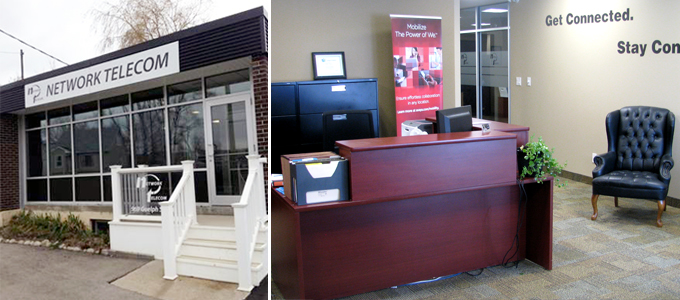In this post, we’re going to explain what a PBX phone system is and where you can find one.
At Network Telecom, we’ve been in the telecommunications industry for more than 40 years, and we’d love to share our expertise with you.
This post will provide you with lots of helpful information about PBX and how it differs from other telecommunication options. So, let’s jump right in.

PBX is a private telephone network used by businesses
What Is a PBX Phone System?
The letters PBX stand for “Private Branch Exchange.” Simply put, a PBX system is a private telephone network that is used by an individual business or organization.
With a PBX system, you can communicate both externally with callers outside of your organization and internally with callers within your company.
Advantages of a PBX System
This type of system allows you to:
- Have more phones than physical phone lines
- Make calls free of charge between internal users
- Transfer calls to extensions
- Have voicemail service
- Do call recording
- Have interactive voice response and call queues for customers
- Business hour settings for routing calls after hours
Where to Find a PBX System in Kitchener/Waterloo
If you are looking to purchase a new PBX phone system, contact the telecommunication specialists at Network Telecom. We have been selling, installing, and servicing every type of phone system for over 40 years. If your current phone system needs repairs, we are available to help you 24 hours a day 7 days a week, 365 days a year.

Network Telecom can help you choose the right phone system for your needs
What Is the Difference Between Residential Landlines and a PBX System for Business?
A PBX Phone System is different from a residential telephone line because it has key voice features that businesses need in order to function more efficiently and connect people at work.
This means that the business can have free desk-to-desk calling through different extension numbers without having to pay for a separate phone line for each individual phone in the company. Your residential phone, on the other hand, runs on an individual phone line that you pay for.
What Is the Difference Between Traditional Analog and IP PBX?
Traditional Analog:
Traditional Analog PBX means that your system would use analog (traditional phone lines) to operate. The disadvantage of the traditional phone system is that you are limited to a certain maximum number of outside phone lines, known as trunks. You also only have a maximum number of internal phones or extensions. Users must share the outside line if you want to make calls outside of your organization.
For example, if you only have two outside lines and they are currently being used, you will have to wait until someone finishes their call in order for you to make yours.
Traditional phone lines run on an analog signal
IP PBX:
With the advancement of the Internet, many PBX systems are now using the Internet Protocol (IP) as their communication channel instead of the traditional analog lines.
The biggest advantage of the IP PBX is that you can practically have an unlimited number of extensions and trunks so you are not restricted when you need to increase the size of your system.
IP PBX also allows you to have more complex features that would be very expensive if you had them implemented on a traditional system such as:
- Automated receptionist
- Reporting
- Ring groups
- Unlimited voicemail
- Call transfers to a mobile device

IP PBX uses the internet instead of traditional phone lines
Hosted vs On-Premise
Hosted PBX:
Hosted PBX, also known as hosted VoIP, is an internet phone system where your service provider looks after housing and handling the technology for your IP PBX at their location.
Your desk phones are then plugged into a router that will connect them through the internet to your service provider’s location. Your service provider will charge you a monthly fee that will include the number of minutes you can use as well as certain available features, or you can be charged at a per-call rate.
If you know how many minutes on average you use per month, you can quite easily calculate your best option package.
Pros:
- Upfront costs are less because you only have to purchase an IP phone or possibly a router and network switch.
- Easy to add extra lines
- Upgrades and new features are included
- No maintenance costs
Cons:
- You may have to upgrade your network at your own expense.
- Extended features may cost extra
- Staff training is your responsibility
Best for: Businesses that don’t want to have a huge upfront investment; smaller or newer businesses that don’t have the budget yet for an on-premise system

Hosted PBX makes it easy to add extra lines as you grow
On-Premise PBX:
On-premise PBX or an IP-PBX phone system is a lot like a traditional system in that the system itself is located in your facility, not at your service provider’s facillity. You have IP phones that connect to your IP-PBX server through a local area network. Your calls go through a traditional phone company as well as a VoIP system.
Pros:
- Lower monthly costs once initial purchases are made
- Ability to use SIP trunking to lower call costs even further
- More control over the system because it is yours – you can choose when to update
Cons:
- Upfront costs are more because you have to buy your server and any accompanying hardware as well as your IP phones
- Maintenance costs are your responsibility
- Training is your responsibility
Best for: Businesses who want to have more control over their phone system and businesses that have the initial capital to invest upfront to enjoy savings down the road.
Want to Learn More?
If you want to go even deeper to learn more about the different telephone systems and how they work, check out this video.
Need a New Phone System? Network Telecom Can Help
If you need to update your current business phone system, partner with Network Telecom. We will help you choose the best phone system for your business. Whether you are looking to have a new phone system installed or your current system updated, you can trust Network Telecom to offer you the expert advice you require.
We also provide a full range of voice mail solutions and voice mail support services. If you are looking for helpful advice about how you can improve your current voicemail system, talk to the professionals at Network Telecom. In addition, we can help you with video conferencing solutions that will meet your business’s particular needs.

If your phone system is not working as it should, our trained technicians are available to help 24 hours a day, 7 days a week, 365 days a year. We carry a huge selection of parts in order to quickly solve any components issue you are experiencing. If you are having a telecommunication or networking issue, we can resolve it quickly and professionally.
In addition to our accredited and certified technical expertise, we offer:
- Consultative Sales
- Cloud Services
- Ongoing Support
- Voice Mail Systems
- System Design + Consulting
- System Admin + User Training
- PA Systems
- VoIP Specialist
- Network Cabling
“Network Telecom is an excellent company when it comes to Data and Phone communications setup. The company I work for consulted with Network Telecom to provide us with a new phone system. They did an excellent job showing us the available options and helped us to select the correct phone system for our business. They are very friendly, knowledgeable and respond quickly to any problems. They would be an asset to any company looking to partner with a Telecommunications company.”
– Duane Cowan
Contact us today for all of your telecommunication questions and concerns; we’d be happy to help you.

